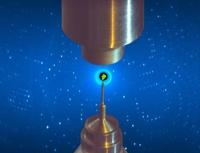Speaker
Description
Many low molecular weight compounds and peptides are capable of forming supramolecular complexes. In the form of such complexes, the molecules are capable of multicenter cooperative binding to target proteins. It is advisable to study these complexes using small-angle scattering methods in combination with molecular dynamics modeling in the free diffusion approach.
When studying the mechanism of interaction of a triazavirin drug with polypeptides by neutron small angle scattering methods in combination with molecular dynamics, it was shown that the drug molecules are capable of forming linear supramolecular complexes and altering the quaternary structure of proteins (Shvetsov et al. 2018)(Zabrodskaya et al. 2018)(V. V. Egorov et al. 2017). Supramolecular amyloid-like peptide complexes are capable of specific effects on the secondary structure of the protein, which can be used to create a new class of antiviral drugs, as was shown using small-angle neutron scattering and time-resolved x-ray scattering(Zabrodskaya et al. 2017)(V. V. Egorov et al. 2013)(Matusevich et al. 2015).
The interaction of supramolecular complexes formed in lipid membranes with receptors can be used to modulate cell signaling, including the creation of immunomodulating drugs that affect T cells. The effect of complexes on the chromatin structure can be used to create a new class of drugs - epigenetic regulators that affect gene expression(Lebedev et al. 2019).

